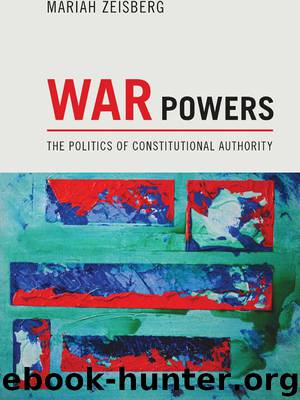War Powers by Zeisberg Mariah

Author:Zeisberg, Mariah [Zeisberg, Mariah]
Language: eng
Format: epub
Publisher: Princeton University Press
Published: 2013-12-12T05:00:00+00:00
Chapter 4
DEFENSIVE WAR
* * *
The Cuban Missile Crisis and Cambodian Incursion
Consider two independent acts of war of two separate presidential administrations: the 1962 Cuban Missile Crisis of the Kennedy administration, and Nixon’s interventions in Cambodia. In the fall of 1962 Kennedy had assured Congress there were no offensive missiles in Cuba, consistent with statements he was receiving from the Soviets and from personal communication from Khrushchev, and consistent with the beliefs of US intelligence. When it became apparent that missiles were being installed, Kennedy kept quiet, notifying allies before he notified the public or Congress. He kept the situation secret while preparing for nuclear war and actually initiating an act of war, a blockade, that was not announced until it was being executed. It is plausible that Kennedy kept the blockade secret for electoral reasons; Republicans were attacking him for failures in Cuba, especially the disastrous Bay of Pigs.1
Nixon cited this “finest hour” of the Kennedy administration as precedent for the Cambodian invasion.2 Nixon’s intervention in neutral Cambodia began with bombings in 1969, and then proceeded to ground troops in 1970 and ongoing bombing until late in 1973. All of the interventions prior to the Paris Peace Accords (1973) were publicly justified as a way to weaken that country’s value as a supply line and conduit of soldiers into Vietnam. Nixon, like Kennedy, may have kept his actions in Cambodia secret to evade domestic political pressure—in this case, against escalating the war in Vietnam.
In neither of these cases were the president’s acts of war statutorily authorized. Both were justified according to the president’s independent war authority, but neither represented a response to an immediate attack or invasion. Both were kept secret from Congress and the public. If we view these two acts according to a settlement model of war powers, they rise and fall together.
However, the relational conception of war authority introduces a new set of terms for evaluating these acts. Applying these terms to each president’s conduct, I argue that the relational conception accommodates and explains the common intuition that the acts can be constitutionally distinguished. A first difference arises from applying the substantive standard that a president’s conduct be justifiable on grounds of defense. I assess the nation’s defensive security interests not in a freestanding way, but rather through the filter of the security order that constructed the president’s independent war authority in the first place. While both were responses to threats specified through a Cold War security order, the identification and management of threat in Kennedy’s case was more deeply connected to the terms of that order than was Nixon’s. The acts can also be distinguished on processual grounds. Kennedy’s exercise of war power was more deeply connected to his skillful use of executive branch governance capacities.
Download
This site does not store any files on its server. We only index and link to content provided by other sites. Please contact the content providers to delete copyright contents if any and email us, we'll remove relevant links or contents immediately.
The Thirst by Nesbo Jo(6932)
Permanent Record by Edward Snowden(5838)
The Myth of the Strong Leader by Archie Brown(5498)
Spare by Prince Harry The Duke of Sussex(5175)
A Higher Loyalty: Truth, Lies, and Leadership by James Comey(4951)
Secrecy World by Jake Bernstein(4740)
Adulting by Kelly Williams Brown(4565)
The Borden Murders by Sarah Miller(4312)
Machine Learning at Scale with H2O by Gregory Keys | David Whiting(4292)
Killers of the Flower Moon by David Grann(4037)
American Kingpin by Nick Bilton(3875)
The Secret Barrister by The Secret Barrister(3696)
Fear by Bob Woodward(3692)
Future Crimes by Marc Goodman(3592)
The Last Girl by Nadia Murad(3505)
The House on Mango Street by Sandra Cisneros(3463)
Liar's Poker by Michael Lewis(3441)
Oathbringer (The Stormlight Archive, Book 3) by Brandon Sanderson(3154)
The Social Psychology of Inequality by Unknown(3018)
